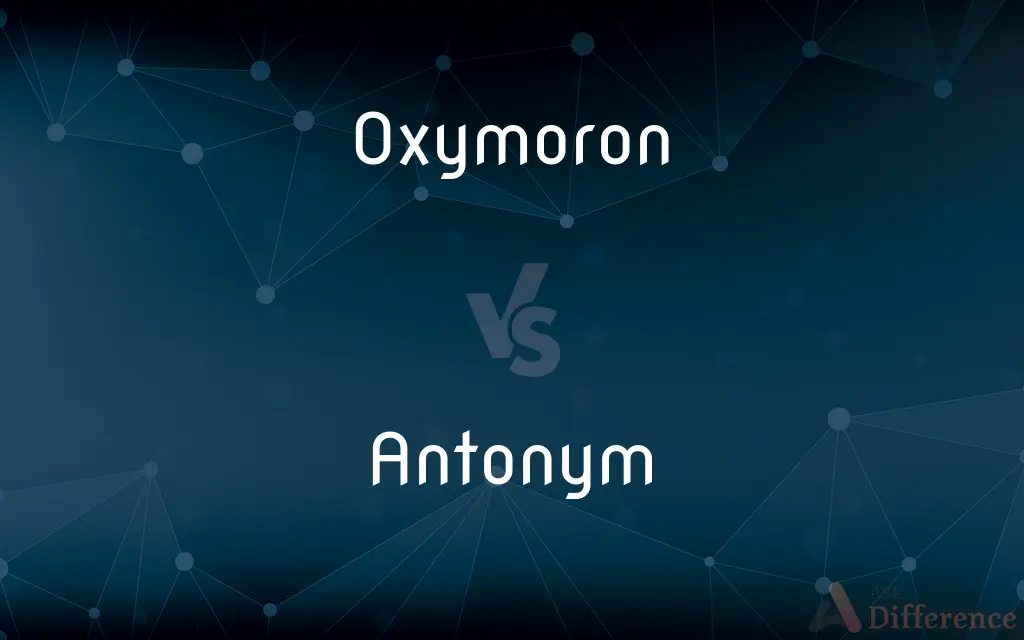Oxymoron vs. Antonym — What's the Difference?
By Maham Liaqat & Fiza Rafique — Updated on April 23, 2024
An oxymoron combines two contradictory terms to create a composite meaning, while an antonym refers to words with opposite meanings.

Difference Between Oxymoron and Antonym
Table of Contents
ADVERTISEMENT
Key Differences
An oxymoron is a figure of speech in which two seemingly opposite or contradictory terms are used together for effect, such as "deafening silence." On the other hand, antonyms are words that have opposite meanings, such as 'hot' and 'cold'. These linguistic tools serve different purposes in communication.
While oxymorons often enrich a phrase to create a unique or paradoxical meaning, enhancing literary or poetic expressions, antonyms simply convey polarity or contrast between concepts without necessarily creating a new meaning or effect.
Oxymorons are employed to add dramatic effect or to make a statement more memorable by juxtaposing conflicting ideas, such as "bittersweet" or "living death." Conversely, antonyms are used in everyday language to describe qualities or states that are directly opposite, aiding in clear and direct communication.
In literature, oxymorons can reveal deeper insights into characters, themes, or situations by highlighting complex emotions or contradictory states of being. Antonyms, while also useful in literature, are more straightforward and serve to clarify descriptions or arguments by presenting clear distinctions.
Understanding oxymorons requires a grasp of the nuanced interplay between the combined words, whereas antonyms are straightforward and typically require only knowledge of the meanings of the individual words to understand the contrast.
ADVERTISEMENT
Comparison Chart
Definition
A combination of contradictory or incongruous words
Words that have opposite meanings
Purpose
To create a paradoxical or rhetorical effect
To express direct opposites in meaning
Usage
Literary and poetic expression
Everyday language and communication
Examples
"Open secret," "Seriously funny"
"Big - Small," "Victory - Defeat"
Effect
Enhances meaning through contradiction
Clarifies by contrasting meanings
Compare with Definitions
Oxymoron
Common in literature to deepen the thematic content.
The novel explored the concept of 'cruel kindness' in its portrayal of the protagonist.
Antonym
Enhances vocabulary and understanding of language contrasts.
Learning antonyms helps children develop a more nuanced understanding of language.
Oxymoron
Creates dramatic effect by combining contradictory terms.
The idea of a 'deafening silence' intensified the scene's eerie atmosphere.
Antonym
Fundamental in constructing logical arguments or descriptions.
He argued that the choice was between 'war and peace.'
Oxymoron
Often used to provoke thought or add humor.
The comedian's act was full of oxymorons like 'clearly confused.'
Antonym
Words that are directly opposite in meaning to each other.
The antonym of 'light' is 'dark.'
Oxymoron
Can highlight the complexity or irony of a situation.
The phrase 'alone together' captures the irony of modern social interactions.
Antonym
Used to describe, compare, or contrast different qualities or states.
Their opinions on the matter were as different as 'night and day.'
Oxymoron
A figure of speech that juxtaposes elements that appear to be contradictory.
She described her feelings as a 'sweet sorrow.'
Antonym
Helps in clarifying communication by opposing concepts.
The instructions were clear: switch from 'hot' to 'cold.'
Oxymoron
An oxymoron (usual plural oxymorons, more rarely oxymora) is a figure of speech that juxtaposes concepts with opposing meanings within a word or phrase that creates an ostensible self-contradiction. An oxymoron can be used as a rhetorical device to illustrate a rhetorical point or to reveal a paradox.
Antonym
A word having a meaning opposite to that of another word
The word "wet" is an antonym of the word "dry.".
Oxymoron
A rhetorical figure in which incongruous or contradictory terms are combined, as in a deafening silence and a mournful optimist.
Antonym
(semantics) A word which has the opposite meaning of another word.
“rich” is an antonym of “poor”; “full” is an antonym of “empty”
Oxymoron
(rhetoric) A figure of speech in which two words or phrases with opposing meanings are used together intentionally for effect.
Antonym
A word that describes one end of a scale, while its opposite describes the other end, such as large versus small; a gradable antonym.
Oxymoron
A contradiction in terms.
Antonym
A word of opposite meaning; a counterterm; - used as a correlative of synonym.
Oxymoron
A figure in which an epithet of a contrary signification is added to a word; e. g., cruel kindness; laborious idleness.
Antonym
Two words that express opposing concepts;
To him the opposite of gay was depressed
Oxymoron
Conjoining contradictory terms (as in `deafening silence')
Common Curiosities
Can an oxymoron be more than two words?
Yes, oxymorons can extend beyond two words, though they traditionally consist of a pair of contradictory terms.
How do oxymorons enhance literary works?
Oxymorons add depth and intrigue by revealing the complexities of characters or themes.
What are some common pairs of antonyms?
Common pairs include 'high' and 'low', 'success' and 'failure', 'entry' and 'exit'.
What role do antonyms play in everyday communication?
Antonyms help people articulate clear differences in discussions and explanations.
Can you give an example of antonyms used effectively?
"She contrasted the benefits and pitfalls, describing them as 'advantages' and 'disadvantages.'"
What is the difference in emotional impact between an oxymoron and an antonym?
Oxymorons often create a poignant or reflective effect, while antonyms are more utilitarian in clarifying distinctions.
Can antonyms be subjective?
While most antonyms are clear-cut, context can influence how opposites are perceived.
What makes an effective oxymoron in poetry?
An effective oxymoron in poetry cleverly combines words to evoke emotion or highlight irony.
What is an example of an oxymoron in a sentence?
"The comedian was seriously funny in his performance."
Why are antonyms important in language?
Antonyms enhance clarity by enabling precise comparisons and contrasts between different concepts.
Are there oxymorons that have become clichés?
Yes, phrases like 'old news' and 'same difference' are oxymorons that have turned into clichés.
How can oxymorons be misleading?
If not understood within context, oxymorons can seem nonsensical or confusing.
How do antonyms aid in learning new languages?
Studying antonyms is crucial in learning the range of meanings and opposites in a new language.
Are oxymorons common in everyday speech?
Oxymorons appear in everyday speech more often than we might realize, often adding color and interest to our expressions.
How can learning antonyms improve language skills?
Learning antonyms can improve vocabulary, comprehension, and the ability to engage in nuanced discussions.
Share Your Discovery

Previous Comparison
Champers vs. Shampoo
Next Comparison
Vaccine vs. InoculationAuthor Spotlight
Written by
Maham LiaqatCo-written by
Fiza RafiqueFiza Rafique is a skilled content writer at AskDifference.com, where she meticulously refines and enhances written pieces. Drawing from her vast editorial expertise, Fiza ensures clarity, accuracy, and precision in every article. Passionate about language, she continually seeks to elevate the quality of content for readers worldwide.














































